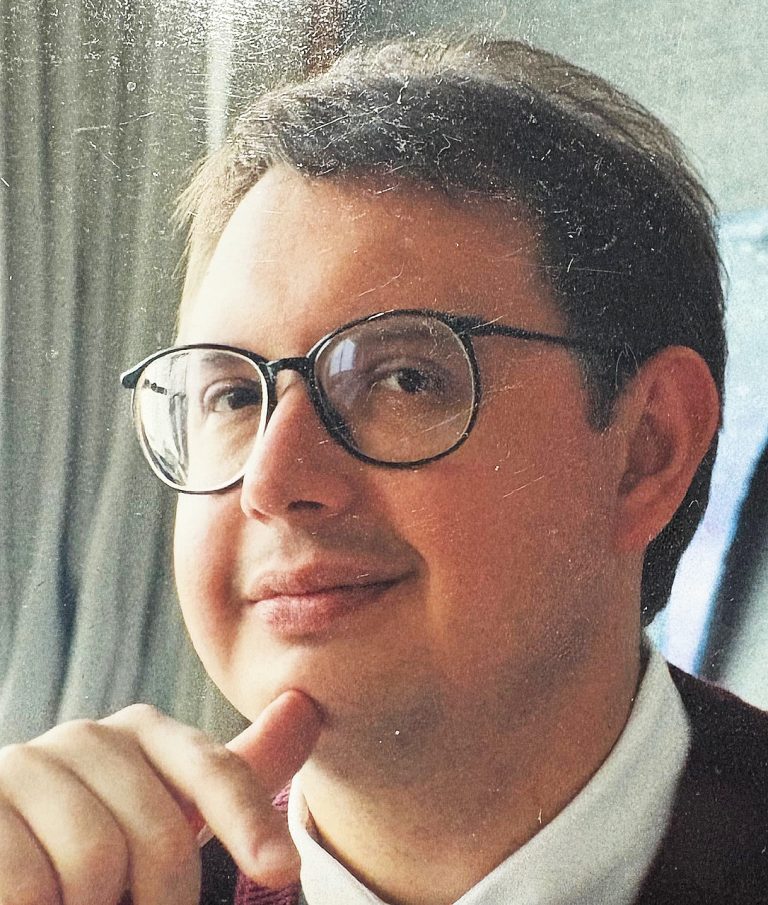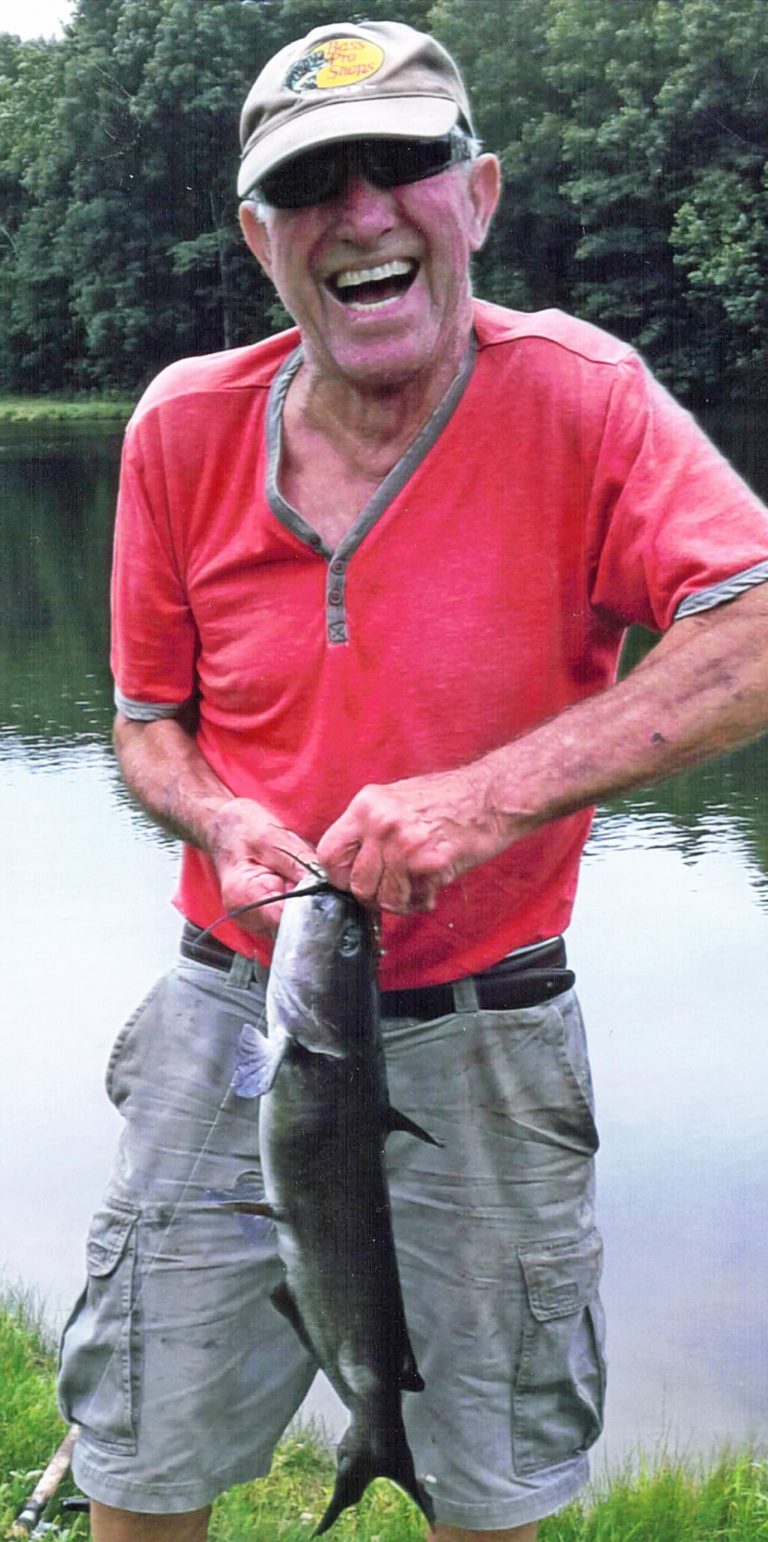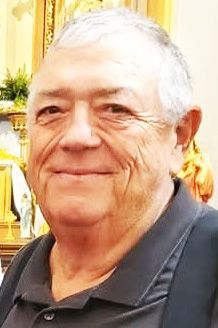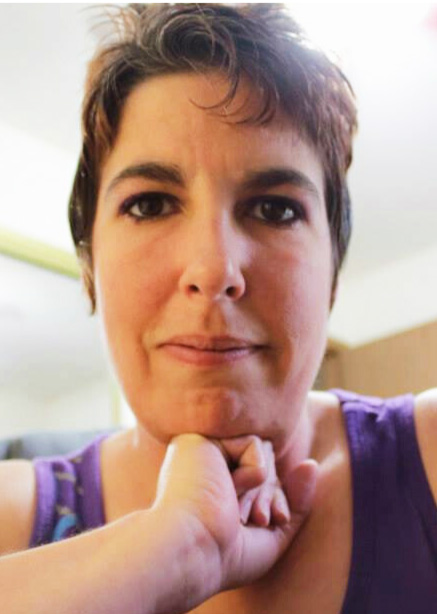John Richard Lenger

John Richard Lenger, 61, “the best Daddy ever,” passed away Thursday, August 7, 2025, at StoneBridge Senior Living, Hermann, Missouri, after struggling with the combined symptoms of Parkinson’s disease and diabetes.
John was a masterful writer, an award-winning journalism professor, and a hands-on editor who worked with everyone from recovering teens in trouble (in a summer work program for which he volunteered) to Nobel laureates. Harvard University’s presidents were also known to have requested his help to polish their prose. John was also a collector of angels, a great joke-teller, a history fan, an antiques expert, and a resiliency star.
Born in Washington, Missouri, on January 26, 1964, John is the son of Richard Lenger and Joan (Klos) Hart. He grew up in St. Charles, a suburb of St. Louis. After studying Journalism and Political Science at the University of Columbia-MO, John had a successful stint with local newspapers before being named editor of the Harvard Gazette, Harvard University’s official newspaper. During his time at Harvard, he lived in Belmont and Arlington, Massachusetts, two towns he loved.
John worked at Harvard University for more than 15 years. During this time, he earned a master’s degree from the Harvard Graduate School of Education/Teaching with Technology and Educational Administration (2000-2002). He also taught journalism principles and practices to undergraduate and graduate students at Harvard Extension School throughout his time at the University. It was John who helped spark the creation of the Harvard Graduate Program in Journalism. His former students, he proudly noted, went on to positions at The New York Times, The Boston Globe, and the Associated Press.
John was the 2005 recipient of the James E. Conway Excellence in Teaching Writing Award, considered the Harvard Extension School’s highest honor for the teaching of writing.
John is remembered for completing every challenging project and managing multiple crises with a calm demeanor and a respectful sense of humor, while frequently wearing elegant bow ties and suspenders. His former colleagues noted the ambitious and strategic projects that were either assigned to John or proposed by him. One of them was Research Matters, a magazine that, according to Joe Wrinn –former director of the Harvard News Office, and John’s former boss– helped Harvard secure federal research funds. Wrinn pointed out that John was also able to bring together three of the communications departments under Harvard’s vice president for public affairs and communications.
John was particularly known for his kindness and intelligence, and — since he became a parent, which transformed his life — for his profound love of Juan Rafael, his only son with Maria Cristina Caballero, also a journalist. John met Maria Cristina while she was a Nieman Fellow at Harvard. One night, working late on a project in the Harvard News Office at Holyoke Center, John was joined by Maria Cristina. She was helping him when he poetically said: “Your eyes enlighten everything.” They got married soon afterward.
John’s mother, Joan Hart, who died in 2021, used to say that as a boy, John frequently carried a big dictionary and looked for definitions, synonyms, and antonyms. She also proudly repeated that while in high school, John kept winning writing prizes — the certificates she kept in carefully organized albums.
Jeff Livingston, John’s best friend during his high school days at St. Charles and his roommate during college, remembers that John decided to launch his own newspaper called Graffiti, dedicated to colorful feature stories. Simultaneously, he wrote dozens of articles for the official college newspaper: The Maneater. Jeff remembers that John didn’t sleep many nights because he was dedicated to meeting deadline after deadline.
John himself once estimated that he published more than 1,000 articles, including one describing an afterlife experience that he had while he suffered a diabetic coma. In his own words, he then left his physical body and saw himself curled like a “comma” lying on the floor. After recovering, he started collecting statues of angels. One of John’s hobbies was to rescue and repair broken angels. He also had other collections such as coins, stones, and Harvard memorabilia. John loved to read about history and the American Revolution, most notably Boston native Paul Revere. He could recite by heart “Paul Revere’s Ride,” Longfellow’s famous poem.
John was unique and was loved by many, including relatives, friends, and former colleagues. His friend Jeff Livingston remembers unforgettable anecdotes: “…While we both were in high school in Saint Charles, MO, and we were about 17 years old, I used to drive a Volkswagen from my mother and frequently picked up John and other classmates to go places. The Volkswagen was great for our activities, and it was sad when I had an accident and the car was destroyed. I survived. John then decided to organize a funeral for the car. He asked each one of us (four classmates) to go and get a piece of the destroyed car. Afterwards, he asked us to also bring candles, and meet at the top of a bridge above a river. John decided that each one of us should light up a candle and throw a piece of the car to the river while saying some words about the car. He said we should honor the car because that car had been good to us.”
Shortly afterwards, John had the idea to organize a musical band to participate in the school’s talent show. John named the band “Five Neat Guys on Rye”. He then proposed to sing and dance “Do you want my body.. Do you think I am sexy”, from Rod Stewart. “Our presentation was not harmonious, but was a big hit!” stated Jeff.
Among many other anecdotes, Jeff shared that while attending college, John played poker with Brad Pitt, who later became a famous actor. He was studying journalism at that time, too. John was great at playing poker because he had received lessons from his dad, Richard Lenger. “Brad Pitt lost all the poker games that he played with John. He used to say that Brad Pitt was good-looking, but he was very, very bad at playing poker,” Jeff stated.
Joe Wrinn, John’s former boss at Harvard University, wrote a thoughtful letter to John after John started the hospice stage. These are a few paragraphs from his letter:
“… You’ve made colleagues better with your editing and a younger generation smarter with your teaching. There’s all that, then there’s what you’ve meant to me. I have never had such a loyal and supportive colleague as you, sir. You were there through thick and thin – deflecting credit to others in the good times while being protective and supportive of me in the not-so-hot times. We jumped into the deep… so many times without preservers including the real-time daily newspapers for the internet conferences in which you managed 12 freelance writers, the Research Matters magazine that helped Harvard secure federal research funds and tie all three of our VP’s departments together, and the countless Gazette supplements born of political expediency that added to your already important and impressive Gazette (Harvard newspaper) portfolio. You saved me from myself so many times I lost count. Examples ranged from correcting some of my bone-headed statement drafts to calming me down and finding a solution when somebody was driving me nuts in Mass Hall or down the hall. That and becoming my personal spell checker before there was Spell Checker! I will forever be grateful to you on so many levels. Good speed, John Lenger. Love, Joe.”
After John was promoted, he interviewed and hired Terry Murphy to replace him as managing editor of The Harvard Gazette. Terry wrote:
“… I remember so clearly you interviewing me for the job. It was such a good fortune that you saw my potential. I was also so lucky to have had the opportunity to be a part of the Gazette when it was centered in the Harvard community … I wanted you to know that I appreciate all you shared with me and taught me, and I know I was a pain in the butt, but you were gracious about it. I remember your bow ties and suspenders. I remember your calm approach when I would be flipping out. You were a wonderful colleague, I hope you know that … I have been thinking of you, which I almost always do when I am cropping a headshot for the Daily Gazette (our online publication … no more print). OMG, I remember I went through a phase where I wanted headshots to be off-center. It was horrible, and you tried to tell me that, but I was stubborn. I should have listened. I laugh now when I think about it. Love, Terry.”
Another of John’s friends and former colleagues, Alvin Powell, wrote:
“Hey John, I want to express my thanks for our friendship. I met you at a pivotal moment in my life – I’d recently moved to Boston, left my job at Bloomberg, and was unemployed, looking for clients for a freelance business. When we met that day at John Harvard’s (sadly gone now), I came in shorts and a T-shirt. Jen had just said we were meeting a “friend” of hers – I remember you suggested I dress better for my next job interview (that was news to me!). Well, you know the rest: my freelance gig turned into a permanent job, which turned into 24 years, important professional experiences, including more forays into longer form writing than I’d done before, travel to difficult places, and my introduction to the teaching world, which started when we co-taught Basic Journalism. I recall we even did a fishing trip in a canoe on the Sudbury River, though I don’t remember if we caught anything. Anyway, belated thanks for our long association and your friendship. I wish all the best for you and your family. Al.”
Georgia was a student having an internship at the Harvard News Office when John was hired. She was in charge of the Harvard calendar of activities. She also wrote a message to John when he started his hospice stage:
“Dear John, This is Georgia. Remember me? It’s been a while! I was a Harvard student at the News Office when you started there. We go way back together!… You were always calm and easygoing, even when stress and deadlines were happening. I remember you always had a Big Gulp (is that what they were called?) in your hand… So much has changed… I left Harvard in 2016 and live in Wisconsin now. It’s beautiful here… Remember when I did that picture of you with rainbow polka dots? It was in the exhibit I had at Harvard Neighbors Gallery. I don’t do exhibits anymore, but I still make art, and I’m always taking classes and learning something new. Last week, I did a weeklong workshop on suitcase theatre, making puppet shows out of a suitcase. Thinking of you and sending much love and good wishes. Love, Georgia.”
Evan Whitney, who (when John arrived) worked at the Harvard News Office front desk answering phones, also wrote a message to John stating that he had transformed his life. Evan pointed out that John told him he was too smart to just be answering phones. John decided to dedicate time to teaching Evan journalism. Evan himself wrote that thanks to all that John taught him, he later got a job in the journalism field. After learning about John’s passing, Evan wrote:
“John was among the first colleagues I came to know at Harvard after joining the Harvard News Office in 1996. From the outset, he impressed me with his intelligence, humility, and quiet good humor. Above all, he was unfailingly kind — a gentle soul who listened without judgment and offered encouragement with ease. In an environment that could often feel like a professional tempest, John was a steady center of calm, guiding the telling of the University’s story with both authenticity and heart. He was, in every sense, a good man whose presence quietly elevated all who had the privilege of knowing him. John was loved and admired by many. He will be missed but remembered fondly.”
John indeed had a big impact on the lives of many, starting with his own son, his wife, his colleagues, and many relatives and friends. He also had an impact on his competitive professional field:
Summarizing his work experience, John himself once wrote: Senior communications professional with more than 30 years of experience producing award-winning websites and publications. Deadline-driven former daily newspaper editor ensures quality and accuracy in all communications. Writer of more than a thousand published articles. Strong track record in developing attention-getting content for high-profile, high-traffic websites. Highly successful writing teacher/coach. Hands-on editor has worked with everyone from teenage drug dealers in summer work programs to Nobel laureates. Fifteen years in higher education at Harvard University. Assisted prize-winning authors and Harvard presidents in polishing their prose. Specialties in crisis communications and emergency planning; science/health/medical writing and editing; community-outreach publications.
John recently celebrated Juan Rafael’s 21st birthday. He indicated it felt great to know that he was the one who inspired his son to be an engineer dedicated to inventing devices to help people with movement disorders such as Parkinson’s, the devastating disease that he had. John smiled when his son told him he would continue living forever through his inventions.
John will be missed by many. John is survived by his father, Richard Lenger (Beverly), of O’Fallon, Missouri; his stepfather, Craig Hart, of St. Charles, Missouri; his brother, Matthew Lenger (Melissa), of St. Peters, Missouri, his son, Juan Rafael Lenger Caballero, of Arlington, Massachusetts, and Juan’s mother, Maria Cristina Caballero. He is preceded in death by his mother, Joan Hart.
Visitation will be held Saturday, August 23rd, from 10 a.m. to 1 p.m. at Toedtmann & Grosse Funeral Home, Hermann. Burial will be at St. George Cemetery. Memorial donations may be given to the Michael J. Fox Foundation for Parkinson’s research.



